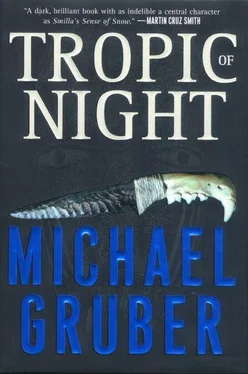Michael Gruber - Tropic of Night
Здесь есть возможность читать онлайн «Michael Gruber - Tropic of Night» весь текст электронной книги совершенно бесплатно (целиком полную версию без сокращений). В некоторых случаях можно слушать аудио, скачать через торрент в формате fb2 и присутствует краткое содержание. Жанр: Полицейский детектив, на английском языке. Описание произведения, (предисловие) а так же отзывы посетителей доступны на портале библиотеки ЛибКат.
- Название:Tropic of Night
- Автор:
- Жанр:
- Год:неизвестен
- ISBN:нет данных
- Рейтинг книги:4 / 5. Голосов: 1
-
Избранное:Добавить в избранное
- Отзывы:
-
Ваша оценка:
- 80
- 1
- 2
- 3
- 4
- 5
Tropic of Night: краткое содержание, описание и аннотация
Предлагаем к чтению аннотацию, описание, краткое содержание или предисловие (зависит от того, что написал сам автор книги «Tropic of Night»). Если вы не нашли необходимую информацию о книге — напишите в комментариях, мы постараемся отыскать её.
Tropic of Night — читать онлайн бесплатно полную книгу (весь текст) целиком
Ниже представлен текст книги, разбитый по страницам. Система сохранения места последней прочитанной страницы, позволяет с удобством читать онлайн бесплатно книгу «Tropic of Night», без необходимости каждый раз заново искать на чём Вы остановились. Поставьте закладку, и сможете в любой момент перейти на страницу, на которой закончили чтение.
Интервал:
Закладка:
I heard the door of the mini-mart slam open and the mother and her child emerged and walked toward the corner of the little building. There was a dark alley there that led to the next street, where I supposed they lived. It was a typical South Dade highway-side neighborhood, small concrete-block stucco houses, a few low apartment buildings, still looking bare and exposed after Hurricane Andrew. The woman was holding her forty-ounce beer bottles slung over her wrist in their plastic carrier bag, and was dragging the child along by the arm, twisting it cruelly, muttering to herself. The child was trying to relieve the pain by turning herself toward the woman and in the process, just as they passed into the alley, the girl got in the way of the woman’s legs and she tripped. They both went down on the rough limestone gravel. The woman saved her bottles and let the girl fall on her back. Then the mother yelled out a curse and got to her feet and kicked the girl in the side. The girl curled up into fetal position and covered her head with her pipe-cleaner arms, whereupon I ran up to them yelling, “Stop that!”
The woman turned and glowered at me. “Get the fuck outa here, bitch! Mind your own fuckin’ business.” I moved closer and I could smell the sweat and the alcohol boiling off her.
“Please. Let her alone,” I said, and she took two staggering steps toward me and launched a clumsy overhand blow at my head.
I caught her arm in hiki-taoshi and brought it around behind her back, ude-hineri, and bent her over double and marched her a few yards away and pressed her face into the gravel. I had not done any serious aikido in years but it turned out to be something you don’t forget how to do, like riding a bike. I said, “Stay here, please, I’m going to see if your little girl is all right.” And I rose and walked back to where the child lay unmoving.
I suppose I was on autopilot by then, in some kind of trance from the African thing that was happening, which is not all that uncommon among the Olo, but still unexpected in a South Dade mini-mart, and that is the only excuse for what I did next. The mother did not stay put but came after me in drunken rage, cursing, and I whipped around and caught her left wrist and spun her out in jodan-aigamae-nagewaza. In aikido dojos, subjects of this throw go easily into a forward roll to their right and bounce up smiling; but now, in the dark alley, the woman’s 160 or so pounds were lofted at speed through the night with the force of her own charge, and her head struck the corner of the Dumpster parked there with a dreadful, final sound.
Thick blood poured from an angular dent in her head, and a dark stain was spreading along the center seam of her Bermudas. She was as still as the loaded trash bags that surrounded her. I did not check to see if she was as dead as she appeared, but went to the child and took her hand. She came willingly with me and we got in my car and rolled. As I drove, I looked back into the sickly light of the mini-mart window and saw that the proprietor was still messing with the disassembled pieces of her slush machine. She had never looked at me. I had touched nothing in the store. I asked the child what her name was, but she didn’t answer. By the time we passed Dadeland, she was asleep.
I learned what her name was the next morning in the Miami Herald, a four-inch story on the first page of the Metro section. Mureena Davis, twenty-six, had died in an alley behind a mini-mart at 14230 Dixie Highway. The police believed that she had stumbled while drunk and struck her head, fracturing her skull and breaking her neck. Death was instantaneous. Ms. Davis, a single mother, had no relatives in the area, having lately arrived from Imokalee, and lived alone in an apartment near the scene. Authorities were concerned about the woman’s daughter, Luz, age four, who was seen in the mini-mart moments before the accident by Mrs. Ellen Kim, the clerk on duty. A police search of the immediate area was unsuccessful. Anyone having any information about the child is urged to call …
No mention of a mysterious skinny white lady at the scene. And after that, nothing. Something like a million children disappear every year in this country, all but a tiny fraction either runaway teens or divorce snatches. Except where there is clear evidence of foul play, most urban police departments treat these cases with the attention they give to littering the pavement. I think we are safe for the moment. From the authorities, I mean. Not safe safe, no.
At the Winn-Dixie, under the maddening lights, designed to put you in a trance and make all the food look more delicious than it will taste at home (“Trance States in the Supermarket: A Commercial Application of Shamanistic Technique,” possibly a paper there for someone; not me, though), we cruise the aisles, the child perched up on the basket seat, selecting nutritious foods. I have a good understanding of nutrition actually, since a female anthropologist will necessarily have much to do with women out in the field and the women universally feed the tribe. I talk to her in a low, comforting voice, discussing the various items and how they help us grow big and strong. She seems interested, if hesitant. I doubt she has much experience with conversation, and the visit to the mini-mart that I observed the night I met her was probably a typical shopping expedition. I let her smell the fruit. I open a package of ginger snaps and offer her one, which she shyly accepts and eats, with a deliberation that is painful to watch. We buy a lot of fruit and vegetables, rice, bread, cookies, cereals, milk, butter, cheese, ice cream, red beans, peanut butter, strawberry jam, mayonnaise, eggs, and a piece of snapper I will broil tonight, perhaps with a baked potato and a salad, with ice cream for dessert. Maybe I will even keep some of it down. No meat, though, nothing so red.
She doesn’t respond when I babble, nor repeat the names of the various foodstuffs I name, nor does she point and make demands as I observe the other children doing. She watches, however; her senses are alert. I tell myself she’s a member of a tiny subculture of Americans, one in which the parents murder their children, usually before the age of five, and so I can’t really expect her to respond as these others do, any more than I would expect an adopted Korean child to speak English right away or use a fork.
We pay for the food, $94.86, which seems like a lot, and is probably more than I used to spend on food in six months. The checkout clerk is a man and is not interested in cute little girls; a good thing to remember?avoid motherly-seeming checkers.
Back at our place, I stow away the foods, I cook, we eat. She stays with me while I prepare the meal, watching, on a chair. Since I took her, we have not been out of sight of each other. We even leave the bathroom door open. A bit like life in an African village. I cut up her fish and squoosh her potato up with butter and salt. She seems unfamiliar with any implement other than a spoon. I suspect finger foods and cereal have constituted the bulk of her diet, when she got a diet at all. I demonstrate the use of the fork, and she imitates me. She eats slowly and finishes every bit on her plate. Ice cream seems to be a revelation. She finishes a scoop, and when I ask her if she wants more, she nods solemnly.
After dinner, I wash up and I place her on a chair and show her how to dry and put the dishes on the wooden dish rack. While I wash, I sing a little song the Olo women sing when they pound karite nuts. The words are quite naughty, as might be expected in a song associated with a process that involves thrusting a long thick pestle into a deep mortar about a million times. It has an almost infinite number of verses; I suppose I learned a few hundred in my time there. I often run through them in my head at work, as I have found nothing better to pass the time during a necessary but tedious occupation. I work as a medical records clerk, a job that compares in many ways to pounding karite nuts.
Читать дальшеИнтервал:
Закладка:
Похожие книги на «Tropic of Night»
Представляем Вашему вниманию похожие книги на «Tropic of Night» списком для выбора. Мы отобрали схожую по названию и смыслу литературу в надежде предоставить читателям больше вариантов отыскать новые, интересные, ещё непрочитанные произведения.
Обсуждение, отзывы о книге «Tropic of Night» и просто собственные мнения читателей. Оставьте ваши комментарии, напишите, что Вы думаете о произведении, его смысле или главных героях. Укажите что конкретно понравилось, а что нет, и почему Вы так считаете.












